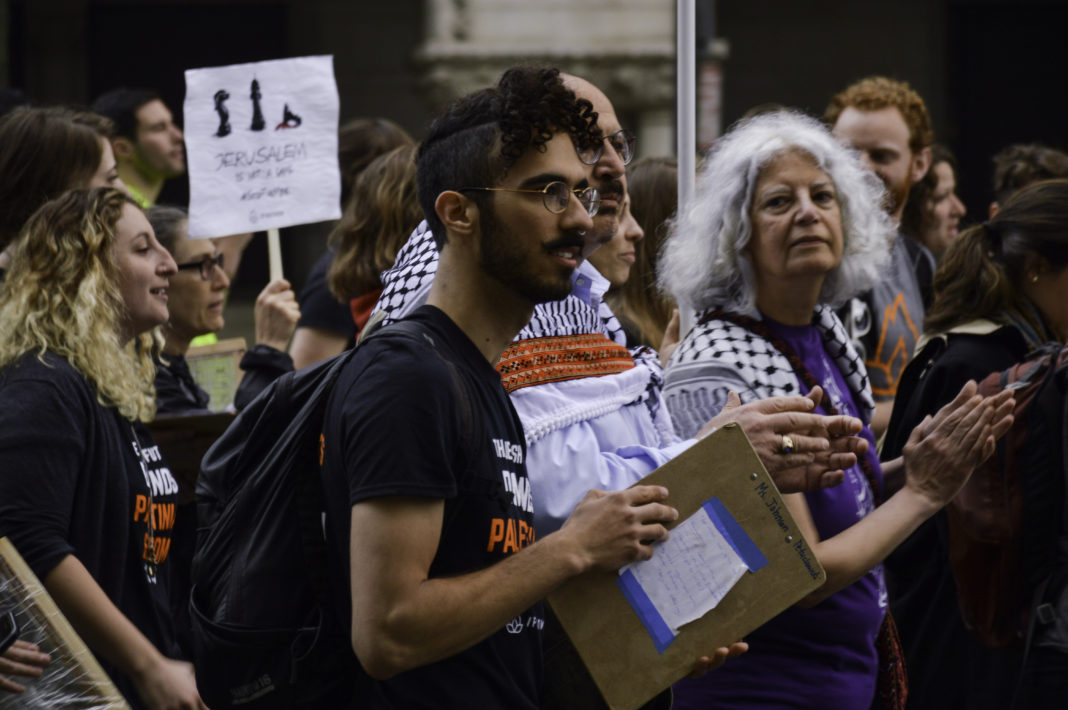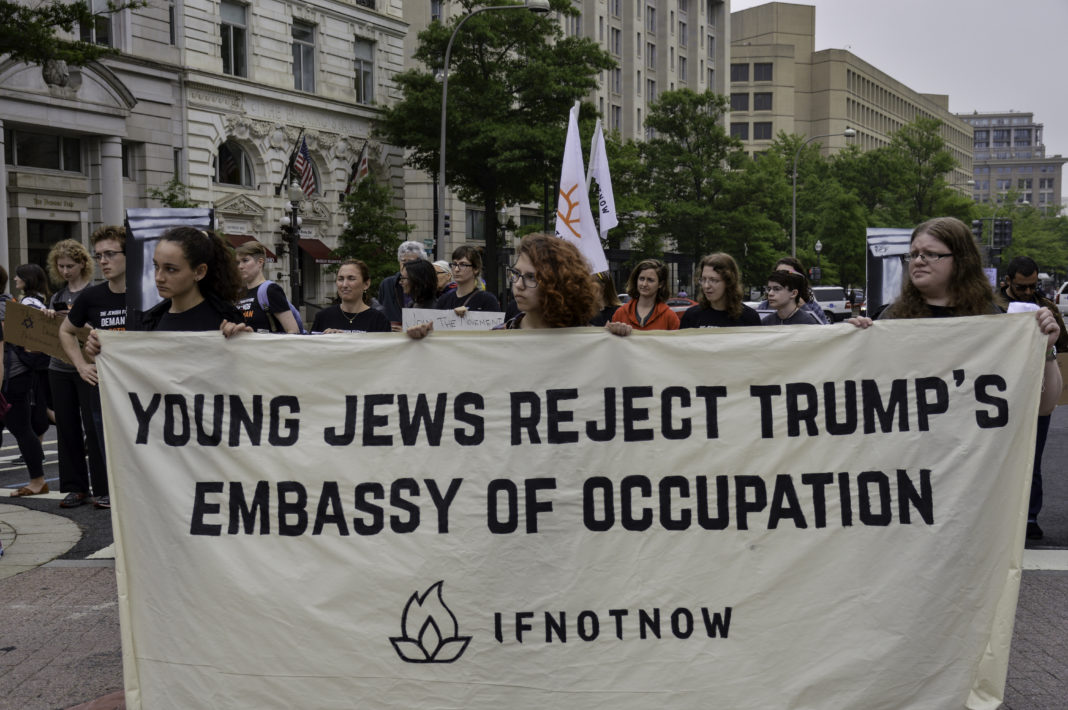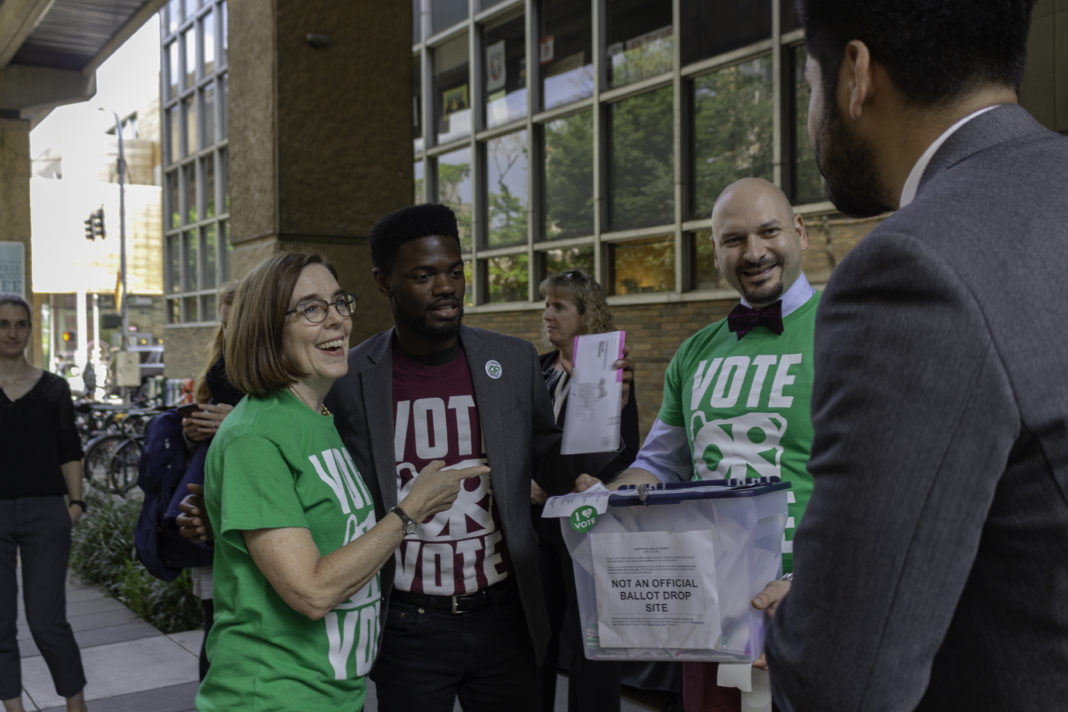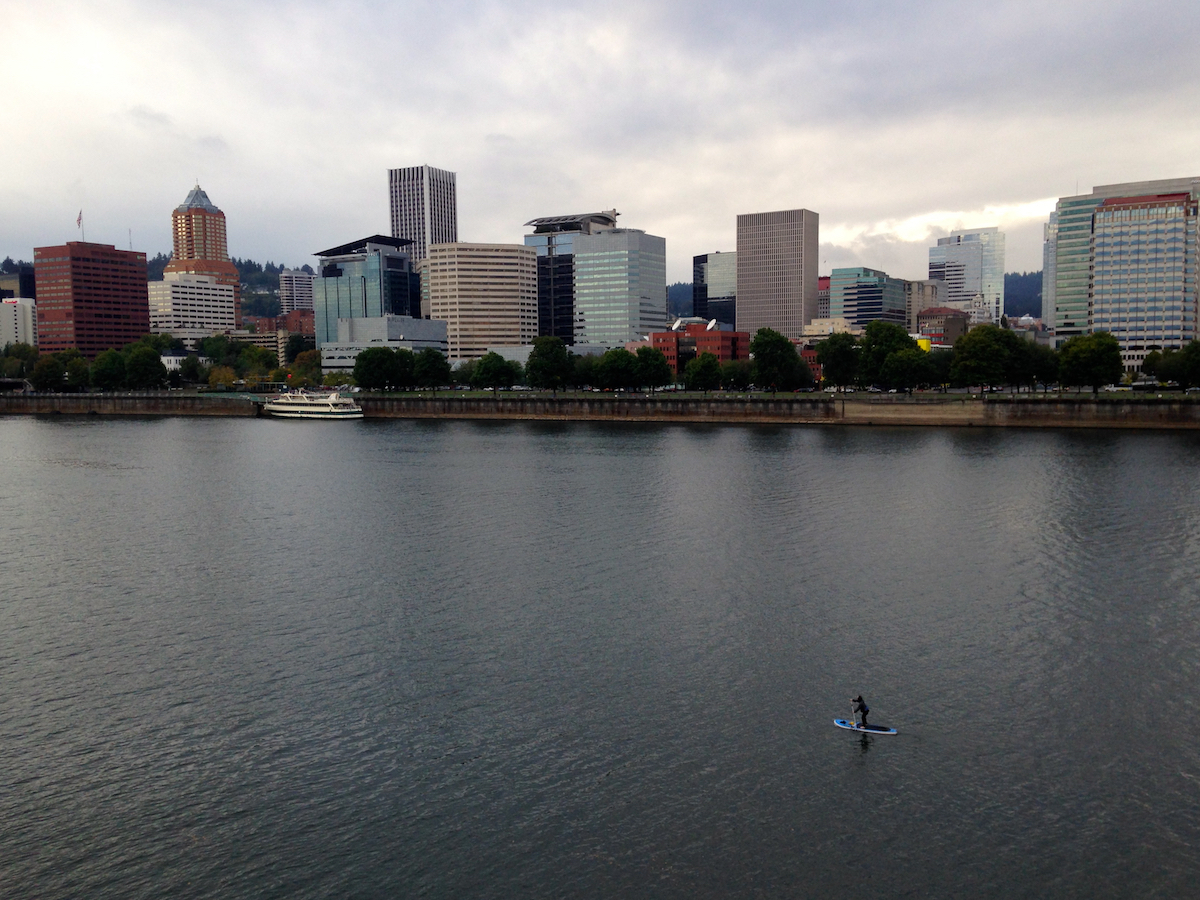Since President Donald Trump announced he would move the United States Embassy in Israel from Tel Aviv to Jerusalem, which he formally recognized as Israel’s capital last year, thousands of people around the world have begun protesting. The embassy officially opened in Jerusalem on Monday, May 14.
Following Trump’s December 2017 announcement, thousands of protesters in Chile and the UK turned out to demonstrate against the decision, while in Turkey demonstrations took place outside the U.S. Consulate in Istanbul and the U.S. Embassy in Ankara.
As of Monday afternoon, clashes erupted between police and Palestinian protesters marching from Ramallah to Qalandiya—the most popular security checkpoint in Jerusalem. Other protests inside the West Bank have been taking place in Bethlehem and Al-Bireh.
In Gaza, as reported by Haaretz, at least 55 Palestinian adults and six children have been killed by Israeli soldiers during protests against the embassy opening, while over 2,200 were wounded, about half of which were from live gunfire.
Turkish President Recep Tayyip Erdoğan has threatened to cut diplomatic ties with Israel, calling the embassy move a “red line for Muslims.” Amid protests in South Africa, the African National Congress downsized its embassy in Israel, and later threatened to cut diplomatic relations with the country.
In January 2018, a representative at the UN’s Universal Periodic Review described Israel as the only apartheid state in the world. On May 14, following the killings along the Gaza border during the embassy ceremony, the South African government recalled its ambassador from Israel.
Tensions rise in the Occupied Territories
Palestinian protests in Gaza against Israel’s long-standing occupation of the Gaza Strip have been ongoing for six weeks but intensified as the opening of the U.S. Embassy approached.
Since these protests began on March 30, over 6,000 participants have been injured and 49 killed, including journalists and medics. The protests ulminate on Tuesday, May 15, otherwise known as Nakba Day, or Day of Catastrophe, which commemorates the 1948 removal of hundreds of thousands of Palestinians from their homes following the creation of the state of Israel.
The Occupied Palestinian Territories—a name designated by the UN—comprise the West Bank and Gaza. Based on a 2017 UN report, around 2 million people live in Gaza, an area of only 365 square kilometers. The unemployment rate is 42 percent with youth unemployment over 60 percent, and only 3.8 percent of water is safe to drink. Movement is severely restricted, and the only three border crossings remain closed a majority of the time.
On Sunday, May 13, tens of thousands of right-nationalist Israelis paraded through the Old City of Jerusalem during an annual event marking the capture of the city during the 1967 Six-Day War. Right-nationalists often use this day to provoke altercations with Palestinian residents. According to Haaretz, police suggested Palestinians close up shop for the day in order to prevent altercations. Israeli Defense Forces guarded the rally where demonstrators were shouting “Muhammad is dead” and “Death to Arabs”.
In Jerusalem, citizen revocation and home demolitions are part of the Palestinian reality. Just recently in March, the Knesset—or Israeli parliament—passed a law which could revoke residency in the case of “breach of loyalty” to Israel.
Israel, Iran and the U.S.
While Israel has lost favor with many governments around the world, relations between Israel and the U.S. are strong. “U.S.–Israel ties have never been better than they are now,” President Trump said at a press conference in March with Israeli Prime Minister Benjamin Netanyahu, who echoed the sentiment.
The U.S. Congress first recognized Jerusalem as Israel’s capital when it passed The Jerusalem Embassy Act of 1995, which set aside funds for the embassy’s eventual relocation. Until Trump, every president since has waived the relocation.
On December 6, 2017, President Trump officially recognized Jerusalem as the capital of Israel. In his address, Trump declared his intention to move the embassy from Tel Aviv to Jerusalem, citing the 1995 Congressional law. He emphasized the Jewish historical connection to the city but did not reference Palestinian connections, alluding only to the Islamic significance of the Al-Aqsa Mosque.
On May 8, Trump officially declared his decision to withdraw from the Joint Comprehensive Plan of Action—known as the Iran Nuclear Deal—after Netanyahu presented what he claimed was evidence Iran lied about its nuclear program.
Netanyahu praised Trump’s decision, as did Saudi Arabia, the United Arab Emirates and Bahrain, but the remaining signatories of the deal—including China, France, Germany, the EU, Iran, Russia and the UK—publicly expressed regret, while Iranian President Hassan Rouhani announced he would continue negotiations without the U.S.
Airstrikes continue in Syria from various government entities including the U.S. and Israel, the latter of which, according to Business Insider, launched attacks just after Trump announced he would withdraw the U.S.
Parallels between Trump and Netanyahu
In an op-ed for The Jerusalem Post, Shlomo Maital, a senior research fellow at the Samuel Neaman Institute, attributed strengthening relations between Trump and Netanyahu to similarities between the two.
Both leaders have been flooded with allegations of misconduct. Faced with several corruption and bribery charges, Israeli police recommended indicting Netanyahu in February 2018. Trump faces allegations of Russian interference in the 2016 presidential election and the more recent scandal surrounding a nondisclosure agreement signed by Trump’s lawyer Michael Cohen and adult film actress Stormy Daniels regarding an alleged affair between Daniels and Trump.
While the charges may differ in both cases, investigations surrounding the leaders have included family members on both sides. Jared Kushner is believed to be involved in the Russia-election collusion, and Sara Netanyahu has been a key figure in the corruption allegations surrounding her husband.
Kushner also received some $30 million from an Israeli firm just before Trump’s first visit to Israel, as reported by Newsweek.
Furthermore, Trump and Netanyahu had similar responses to the charges, first by rejecting them and proclaiming their innocence, and then blaming opposition groups. Both leaders have also called the charges witch hunts and reporting on their behavior fake news. Earlier this year, Haaretz reported that between 2012 and 2017, Netanyahu interfered in at least 13 Israeli news outlets.
Maital also pointed out the wealth of both leaders. With a net worth estimated by Forbes at $3.1 billion, Donald Trump may be the richest president in U.S. history. Netanyahu is also one of Israel’s richest politicians, with a net worth of $11 million.
Political polarization, Maital said, is also apparent in both Israel and the U.S., as shown by Pew Research Center’s 2016 studies of American and Israeli public opinion. White evangelical protestants, which comprise one of Trump’s strongest voting blocs, constitute the largest group to sympathize more with Israel than Palestine: 78 percent, according to a 2018 Pew Research Center Survey.
Trump and Netanyahu are also leaders of their respective right-wing parties, Trump with the Republican Party and Netanyahu with the Likud. According to Middle East Monitor, 62 percent of Israelis view Trump’s decision to exit the Iran deal is in line with Israel’s interests, and support for Netanyahu rose immediately following the decision.
Though the two political figures have been able to forge strong political ties, it’s uncertain how they intend to move forward with a peace process while political ties elsewhere in the region become strained from the recent events.
Unsettled futures
While Trump assured he would continue to pursue a peaceful solution in his White House address, it’s unclear what type of solution that would imply, especially after comments he made last year at a press conference. “I’m looking at two-state and one-state,” he said, “and I like the one that both parties like. I can live with either one.” A two-state solution includes an independent state for Palestine and one for Israel, while the one-state solution referenced here would imply only Israel would retain independent statehood.
Similar concern rests with Netanyahu, who has yet to curb settlement expansion in the West Bank and even ran on a a campaign promise to pursue a one-state solution during the previous election cycle.
The Palestinian Authority remains adamant a one-state solution does not promote peace. PA President Mahmoud Abbas stated recently, “East Jerusalem will be ours and West Jerusalem theirs.” A senior official with the Palestinian Liberation Organization stated in a press conference out of Ramallah “East Jerusalem is an occupied city according to international law, and any such move would be null and void.” Additionally, he accused Nikki Haley, U.S. Ambassador to the UN, of perpetuating Israeli crimes against Palestinians.
Human rights groups offer a new pathway to peace
Non-governmental organizations and non-profit groups like Ir Amim, Al-Haq, Yesh Din, B’Tselem, and Breaking the Silence work to document human rights abuses in the Occupied Palestinian Territories and educate the public on these issues.
Though the issue is often polarized into a pro-Israel or pro-Palestine stance, many human rights groups focus on ending occupation while retaining Israel’s right to exist.
Combatants for Peace, an up-and-coming rights organization, was formed in 2006 by former Israeli and Palestinian combatants. Its vision statement reads, “The cycle of violence can only be broken when Israelis and Palestinians join forces.”
The organization’s work includes conducting educational tours of the West Bank and organizing regional binational groups comprised of both Israeli and Palestinian civilians. In 2017, it was nominated for the Nobel Peace Prize.
In April, CFP held its 12th Memorial Day ceremony in Tel Aviv, an event which brings together those who’ve lost family and friends in the conflict.
“And we Israelis, even after 70 years—no matter how many words dripping with patriotic honey will be uttered in the coming days—we are not yet [home],” said author David Grossman, whose son was killed during 2006 Lebanon War, during the event. “The solution to the great complexity of Israeli-Palestinian relations can be summed up in one short formula: If the Palestinians don’t have a home, the Israelis won’t have a home either.”
However, the event was not without its bureaucratic challenges. After the group extended invitations to 90 Palestinians living in the West Bank, Israeli Defense Minister Avigdor Lieberman blocked them from obtaining the necessary permits to attend. In response, Times of Israel reported, CFP brought the case to the Israeli High Court of Justice, which ordered Lieberman to grant the permits.
About 100 Jewish-American demonstrators rallied outside the Trump International Hotel on Pennsylvania Avenue in Washington, D.C. on Monday, May 14 to protest the embassy move.
According to The Jerusalem Post, ralliers chanted “we will build this world with love” and “we support freedom and dignity for all, Israelis and Palestinians.”









Wow. I never thought I’d read an article where every paragraph has at least one lie . That’s hard to do even by hysterical anti-Israel propaganda standards.